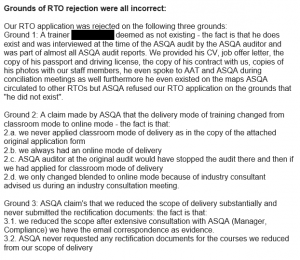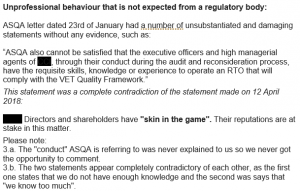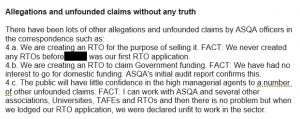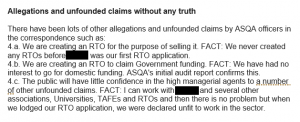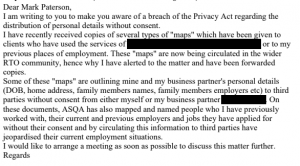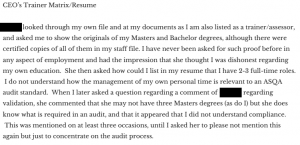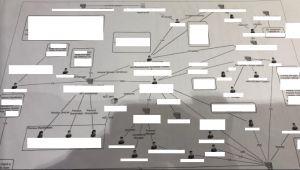Pic: Courtesy @edissuesaus
Note: The pic includes the famous saying of Ex-Chief Commissioner, Australian Skills Quality Authority in the Independent Tertiary Education Conference, Itec 2019 that held on 21-23 August 2019 at Marriott Surfers Paradise, for more information, please refer https://itec19.com.au/program/program/
Yes, you heard it right. The chief commissioner of Australian Skills Quality Authority (ASQA) has resigned from his post after Senator the Hon Michaelia Cash, Minister for Employment, Skills, Small and Family Business and the Hon Steve Irons MP, Assistant Minister for Vocational Education, Training and Apprenticeships and all other Federal, State and Territory skills ministers decided to work together through COAG on a national approach to implement the key recommendations of the Braithwaite and Joyce Reviews.
The industry wholeheartedly has welcomed the change.
We are sharing some of the posts from social media:
“The reforms set out by Michaelia Cash for the #VocationalEducation and #Training system will strengthen the work of independent providers and ensure quality outcomes for students. The change at ASQA is an important step in this journey.”
“Awesome news but long overdue”
“A change is finally coming to the RTO landscape. The question we must ask ourselves is will it be to our benefit or will it be worse than what we have now? Will ASQA finally treat us in the manner they should with proper respect and will they clean it up and remove the old guard and bring in better management?”
“Now there is a parliamentary heat on it – he’s getting out of the kitchen cause its getting hot”
“We can’t make one person responsible for the whole organisation’s failure. More should go, it’s their culture not the system”
“ASQA should be abolished. I have never come across such a corrupt Government body in my over 22 years in the public and private sector.”
“He’s never gonna dance again, guilty feet have got no rhythm..”
“ASQA is going on a brand new TV show called “I’m a regulator, get me out of here!”?”
“The whole culture is toxic. That is why they have a high staff turnover.”
“The big news in several areas, hopefully, ASQA to move towards an ‘Educative direction’ would be a huge advancement in the VET sector, obviously, Mark Patterson is not in agreement with the two VET reports and any new changes on the table, education and regulation go hand in hand for quality, continuous improvement and compliance…I hope this new era will be a win-win for all RTOs”
“It was much needed. I believe all commissioners, General Manager and other managers must go.”
“It’s time for ASQA to go!
Whilst I am a great proponent of a national regulator, ASQA are a dictatorship which must be stopped! NARA were a great system
And even the state based system were better (really did I say that) QLd DET with all its faults performed 1000% better than ASQA
Also ASQA charge like wounded bulls ( I used to pay $800 a year to DET QLD now it’s $8000 a year to ASQA )
Someone has to support the highly paid cohort at the dictatorship”
“Having just gone through the fiasco of an AAT matter against ASQA (and winning!) I can endorse all of your comments and would go further. ASQA has almost destroyed educational training innovation in Australia and set us behind the rest of the Western World by 20 years. My RTO and a previous one have been involved since regulated training started here. It is a shambles and a disgrace. It is so bad now that since I have now started my own ASQA legal consultancy business (as a lawyer with lengthy RTO experience) for those wishing to battle ASQA.”
“ I’ve been a security trainer for the past ten years on and off seasonally when I want to teach. I’ve never seen such a backward system and training information that is outdated and non effective in today’s security industry. Some of the information, I have not seen since the 80’s. The material is not current and made up of people that falsely believe they are qualified security people, but in reality from another planet.”
“It’s time for ASQA to go!
Whilst I am a great proponent of a national regulator, ASQA are a dictatorship which must be stopped! NARA were a great system
And even the state based system were better (really did I say that) QLd DET with all its faults performed 1000% better than ASQA
Also ASQA charge like wounded bulls ( I used to pay $800 a year to DET QLD now it’s $8000 a year to ASQA )
Someone has to support the highly paid cohort at the dictatorship”
“That’s wrong on so many levels. It’s not a behaviour expected from a regulator. “
Moving from unclear guidelines and protocols and transitioning to a quality framework
When the audit guidelines are completely subjective and not objective, auditors are free to twist them, turn them and use them any way they want to. This is one of the many problems in the VET sector.
There is a very famous story, where one (currently employed) auditor made another auditor’s RTO non-compliant. Auditors are hired to follow the guidelines. If they are trained to find and provide quality audit findings and outcomes, how come there are such a difference in judgements that one cannot keep their organisation compliant and the other cannot properly follow the compliance guidelines. Was this a case of an auditor not able to maintain a complaint RTO or an auditor not being able to audit correctly? How is the regulatory body expecting people working in the sector with no audit backgrounds to meet compliance and regulatory requirements?
No two auditors reach the same conclusions. As part of our resource writing arm, CAQA Resources, we have involved a number of auditors and our experience is that the feedback from them is most ot the time contradictory. It takes substantial time and effort, therefore, to produce a final copy of a document that meets the requirements of most auditors and industry experts and where they reluctantly sign off to say it is compliant.
All audit guidelines should be written in a very clear, easy to understand and implement, and audit format. There should be no room for subjective measurements to determine the effectiveness and suitability of practices, policies and procedures. The subjective language of the regulatory standards is the biggest threat to a nationally consistent audit approach and quality management system (QMS) auditors. The regulatory framework should be based on practical experiences and objectives. It should, in reality, be focused on the three main domains:
-
“Industry-centred” i.e. according to the needs and requirements of the industry to ensure Australia leads the vocational education and training throughout the world.
-
“Student-centric” i.e. the student should be the focus from pre-enrolment to course completion.
-
“Quality-based” i.e. based upon continuously improving the standards of education, student-support, trainers, facilities, resources, equipment, infrastructure
All audits should be recorded
The stories and rumours that are circulating in the industry are not good for the Australian Skills Quality Authority (ASQA) and for the training and education industry. These stories and rumours can only stop if all audits are being recorded.
Who audits the auditors?
We have raised our concerns around this in a separate topic in this newsletter.
What the industry wants to see
We would like to see a regulatory body that:
-
Provides training and education: The regulatory body MUST provide very clear expectations and guidelines regarding what is expected from the training organisations for each and every standard and clause. No ambiguity, no double meaning, using simple English language structure and templates.
-
Promotes Australian Education Worldwide: We need a regulator that helps training organisations promote the Australian brand and values worldwide.
-
Encourages technology, innovation and education through different delivery modes: Address the white elephant in the room. Regulatory practices should not be a barrier to using or encouraging technology and stop us from reaching out to the learners. This practice should be abolished immediately and the focus should be on how we can be world leaders in terms of the development of training packages and practices that promote technology, innovation and education through a variety of delivery modes.
-
Encourages continuous improvement: No one is perfect, no organisation is perfect, seeking perfection from any training organisation is setting up incorrect standards and expectations. The organisations, on the other hand, should be encouraged to regularly review their system and practices and evolve through experience, professional development and knowledge. Continuous improvement must be recorded for future audits and regulatory activities.
-
Does not penalise administrivia: ASQA or any other regulatory body should not and MUST NOT penalise any organisation based on minor administrative mistakes.
-
Quality organisations should be appreciated and encouraged: Appreciation and acknowledgement are few factors that drive the training organisations. Good organisations must be acknowledged to set up the standards for the quality, examples and case studies should be discussed to encourage and promote quality,
-
No TAFE or RTO favouritism: A regulatory body must follow their guidelines and protocols, they must not behave or act against the regulatory guidelines at any time. We believe TAFE and RTOs – are both critical for Australia’s economy, industry and students.
-
Criminal and unscrupulous practices must be clearly outlined and should be handled by the Australian Federal Police or other regulatory bodies: if auditors, training staff or any other stakeholders have any concerns regarding unscrupulous providers and their practices, they should be reported to the appropriate regulatory body or police and the responsible people should be brought to justice.
-
No more updates to Certificate IV in Training and Assessment: The minimum requirement for getting into training and assessment in the VET sector should be replaced with a continuing professional development (CPD) policy. The CPD points should be focused on vocational education and training knowledge (foundation), competency-based practices such as validation and moderation, assessment writing, designing and development and technical, professional or workplace skills or practices.
-
Experience and knowledge to get into the training and education industry and fit and proper person requirements: This should be one of the main criteria to focus on in the revised regulatory standards to ensure the right people enter into the sector and industry and there are no or minimum threats to the rebuilding of the reputation of Australia’s education and training system.
Note: We highly encourage involving experienced VET gurus, such as John Price and other highly qualified and experienced RTO consultants and auditors in the review process.

































